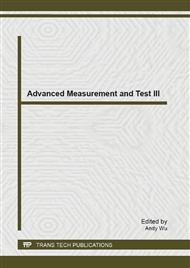[1]
K.J. Jiang, S.L. Zhu. Scenarios of medium and long-term energy demand of urban transport in China. Energy research institute of national development and reform commission, 2009 (in Chinese)
Google Scholar
[2]
Ministry of Transport of P. R. China. China's 12th five-year plan for energy conservation and emission reduction of highway and waterway transportation, 2011 (in Chinese)
Google Scholar
[3]
L.C. Li. Situation and policy of transport energy saving. China development observation, 2006, 12:39-40 (in Chinese)
Google Scholar
[4]
L.X. Shi. Study of Transport Energy Consumption and Carbon Emissions in 2011. Beijing: China economic publishing house, 2011 (in Chinese)
Google Scholar
[5]
Editorial department. Assessment and trend analysis of transport Energy Conservation & Emission Reduction. Energy Conservation & Environmental Protection in Transportation,2012, 1:01-04 (in Chinese)
Google Scholar
[6]
L. Sun. Perspective on policy "bottlenecks" for energy saving and emission reduction of China's motor traffic. Environmental Protection, 2012, 05:52-55 (in Chinese)
Google Scholar
[7]
Z.Y. Li, H.Z. Zhang, X.M. Chen, et al. Ways and experiences of European urban transport energy conservation and emission reduction. Highways & Automotive Applications,2011,3:22-27 (in Chinese)
Google Scholar
[8]
B.X. Qiu, X. Li, F.Q. Yang, et al. China low carbon eco-city development strategy. Beijing: China city press,2010 (in Chinese)
Google Scholar
[9]
Y.R. Shi. Research on Energy Conservation & Emission Reduction Integrated Management System of Highway and Waterway Transportation. Journal of Wuhan University of Technology, 2010,2( 32) :31-37 (in Chinese)
Google Scholar
[10]
Y.M Cao, D.M Ding. Analysis and countermeasure research for energy saving and emission reduction development of China's urban transport. Economic Research Guide,2012,2:89-91 (in Chinese)
Google Scholar
[11]
Y.J. Fan, T.S. Ma. Empirical study on management methods for energy conservation and emission reduction of transportation enterprise. Transportation Enterprise Management,2008,1:20-22 (in Chinese)
Google Scholar
[12]
Department of Transportation of Jiangsu Province. The 12th five-year plan for transport energy conservation and emission reduction of Jiangsu Province. 2011 (in Chinese)
Google Scholar
[13]
R.C. Ding. Urban growth and Countermeasures - International Perspectives and China's development. Beijing: Higher education press, 2009 (in Chinese)
Google Scholar
[14]
Y.Y. Chen. PT in France and Brazil. Public Utilities, 2004, 18(1):14-17 (in Chinese)
Google Scholar
[15]
Z.Y Li. Japan's Inspiration of China's urban transport strategy based on sustainable development of environmental. Communications Standardization, 2008, 12 (in Chinese)
Google Scholar


